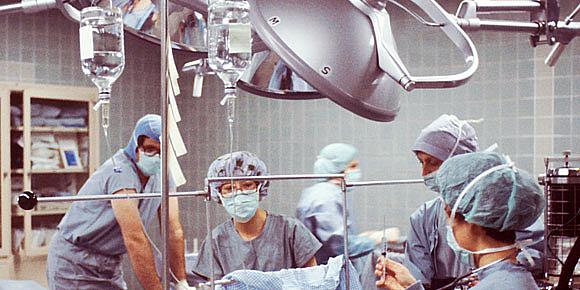A Hernia Gives Birth to New Saying on Healthcare
This story is about the angst and frustration experienced while not having health insurance followed by the serenity experienced after completing a surgical procedure because I was covered with medical insurance

I recently underwent a relative simple medical operation on a hernia.
The journey to reach a surgeon's operating table was long and difficult.
It wasn't always that way. I first discovered I had a weakness on the left side of my abdominal wall 28 years ago. An organ was pushing against the muscle wall, causing a protrusion. This is commonly known as a hernia.
I had medical insurance back then, thanks to my father's family plan with Kaiser Permanente. I simply flew home from college, made an appointment for an examination with a surgeon, and scheduled the procedure. The whole matter took less than 10 days from symptoms to surgery.
I faced a whole different world five years, when I discovered I had another weakness on abdominal wall, this one on the right side. Unemployed and with no medical insurance, I was unable to get treatment.
The problem became worse. At times, caught off guard, I would suddenly experience a sharp pain grabbing me in the groin area. I would wait a few moments until the pain subsided and I could push my innards back into place. On many occasions, as time passed by, I was not able to push them back so quickly. The pain grew greater and lasted longer. I often would have to sit, immobilized, for long periods of time.
I do not know what was worse, the pain or the amount of time I spent worrying about it for years, feeling hopeless to do anything to fix the problem.
In October of 2007, I interviewed for a job as an assistant property manager. They offered me the position contingent on a successful completion of a physical examination. I failed the examination. The physician, upon discovering, the hernia, wrote in his report that I was not cleared to lift more than 25 pounds. The job description required that I be able to lift 50 pounds. The job offer was rescinded.
Months later, another job came open with the same company. The job did not require me to lift 50 pounds, and I was hired immediately. After successfully completing the probationary period, I qualified for medical benefits. With the help of a friend who is a healthcare professional, I was able to navigate my way to the operating table.
Last week, after five years of frustration and living with the fear of my hernia becoming worse and even creating other complications, I successfully underwent the corrective procedure. During the process of getting ready for the procedure, I had a physical and discovered that my blood pressure bordered on hypertension, a common ailment among African Americans. If it had gone undetected, I could have met with an unnecessarily premature end.
I was not alone as I struggled with an untreated ailment for those five years. Indeed, when I walk through the streets of Los Angeles, I encounter many individuals who are obviously ailing, some even bandaged. I often ask them what happened, and they tell me about one form of injury or ailment or another.
Why don't they get their problems fixed? Some tell they simply cannot because they lack the money for treatment and the healthcare insurance to cover the costs. Others express resignation, telling me that an examination will only lead to the discovery of yet another problem that they can't afford to get fixed. Most of the have drawn the conclusion that they will just have to live with their injuries and ailments.
I know what goes on in the lives of these walking wounded. They are unable to rest. They live in a world of high anxiety and silent suffering, ever fearful of something malignant developing inside of them. Many men and women living in middle-class neighborhoods — struggle to remain in half-million dollar homes while sacrificing basic healthcare needs. Down-and-outers in Skid Row no longer fend off the ravages of their untreated ailments get carted off by paramedics. For some it's too late, while others will end up at a county hospital, where medical professionals will often find that the delay of months or years has made matters much more complicated and expensive to treat.
I do not profess to be an expert on healthcare costs, but it seems to me that healthcare insurance would be less than the toll for repeatedly sending paramedics to homes and carrying patients to emergency rooms with problems that have grown in scope because of the delays in treatment. Keep in mind that many such cases will see the hospital charge patients for thousands of dollars of services — bills that will never be paid.
I do know that I woke up after my recent surgery with a fresh scar on my stomach and a beautiful pain to go with it. I felt safe. I could finally look beyond the pain, fear and limitations that were my companions for years. I lay in bed, thinking about the adage "if you have your health, you have everything." I wondered when our leaders would realize that if our nation does not have its health, we have nothing.
Walter Melton is a writer for the LA Beez (www.labeez.org)

